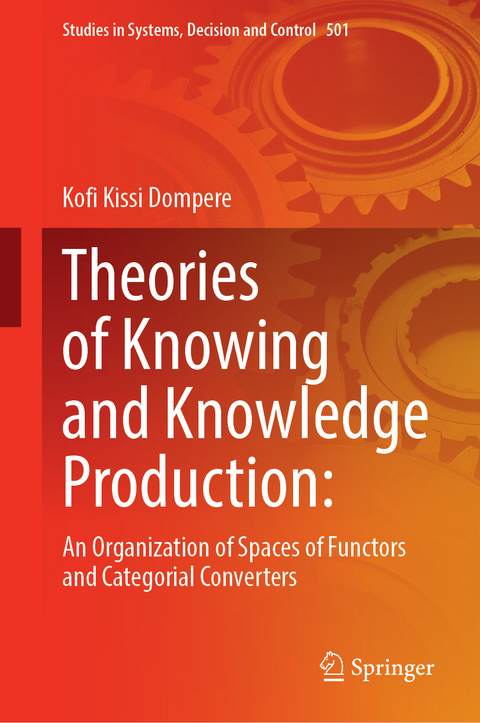
Theories of Knowing and Knowledge Production
Springer International Publishing (Verlag)
978-3-031-42862-3 (ISBN)
The book is devoted to exploring the organizational dimensions of the general space of problem-solution dualities within epistemic fields to examine the diversity and unity of knowing and information-knowledge production in science and non-science and how to account for and explain the forces of variety transformations, as induced by decision-choice actions in creating the functor space and the space of categorial converters as well as to integrate decision-choice qualities of curiosity, creativity, hope, despair, success, failure, and their relationships with epistemic anomalies in the production of intellectual investment flows and capital stocks, and the rise and fall of institutions in response to the dynamics of the open space of problem-solution dualities with open algorithms under the principle of non-satiation. The conditions and sources of uncertainties in human actions are traced though the space of ontic-epistemic dualities as generated by cognitive capacity limitations leading to the concepts of imagination, possibility, and probability with corresponding worlds and then link to the discussions on thinking-reasoning processes with goals, objectives, and visions of education in social set-ups. The concepts and phenomena of anticipation, necessity, expectation, freedom, anomaly, curiosity, creativity, hope, despair, success, and failure contained in the space of imaginations are defined under the concepts of onticity and epistemicity, where their roles in the dualistic-polar journeys are discussed, analyzed, and connected to epistemic transversality conditions under the principle of opposites relative to the conditions of input-output and cost-benefit dualities. The book is to fill in some of the important phenomena needed in my investigation of theory of knowing as a production of intellectual investment flows and information-knowledge accumulation as the production of intellectual capital stocks relative to the disequilibrium dynamics of human intellectual heritage based on fuzzy paradigm of thought, thus providing an added foundation in integrating subjective elements into the development of open artificial intelligence, where cost-benefit values operate to determine varieties over the spaces of true-false and yes-no dualities in machine learning.
lt;p>Kofi Kissi Dompere is a professor emeritus of economics at Howard University. He holds a doctoral degree in economics, master's degree in applied mathematics, master's degree in business administration in finance, and a bachelor's degree in economics and mathematics, all degrees from Temple University in Philadelphia. He has authored several scientific and scholarly works in economics, philosophy, decision theory, and fuzzy mathematics. He is the winner of 2006 Cheikh Anta Diop Award for excellence in scholarship. He has a number of published monographs. He is a resource person for UNITAR (United Nations) and an economic consultant in the areas of cost-benefit analysis, national income accounts, development, and macroeconomics. He is the founder of The Research Institute of Information Decision and Economic Sciences (RIIDES) in which he serves as a distinguished research professor. He is an active participant in discussions on fundamental problems in physics under Foundational Questions Institute - Fqxi..
Preamble.- Dedication.- Prologue.- Preface.- Acknowledgement.- 1.The theory of knowing and organizational analytics.- 2. The information-knowledge.- 3. The theory of epistemic anomalies in the principles of diversity and unity of knowing and science: organizational characteristic-signal analytics.- 4. Onticity, epistemicity, creativity, curiosity and hope-dispair duality.- 5. The theory of epistemic anomalies within the principlesofdiversity and unity in knowing and science: organizational algebraic analytics.- 6. The theory of epistemic transversality conditions over the space of ignorance-knowledge dualities and polarities.- 7. Further reflections on the principle of opposites, the variety space and knowing in the space of ontological-epistemological duality.- epilogue.- index.- glossary of non-engish terms.- references.
| Erscheinungsdatum | 25.03.2024 |
|---|---|
| Reihe/Serie | Studies in Systems, Decision and Control |
| Zusatzinfo | CXIV, 537 p. 20 illus. |
| Verlagsort | Cham |
| Sprache | englisch |
| Maße | 155 x 235 mm |
| Themenwelt | Informatik ► Theorie / Studium ► Künstliche Intelligenz / Robotik |
| Mathematik / Informatik ► Mathematik ► Angewandte Mathematik | |
| Technik | |
| Schlagworte | Decision-choice Systems • Epistemic Fields • Fuzzy Paradigm • Information-knowledge Production • Problem-solution Dualities |
| ISBN-10 | 3-031-42862-5 / 3031428625 |
| ISBN-13 | 978-3-031-42862-3 / 9783031428623 |
| Zustand | Neuware |
| Informationen gemäß Produktsicherheitsverordnung (GPSR) | |
| Haben Sie eine Frage zum Produkt? |
aus dem Bereich


